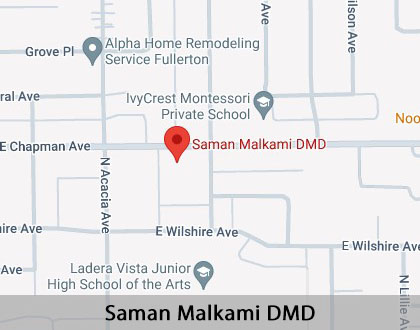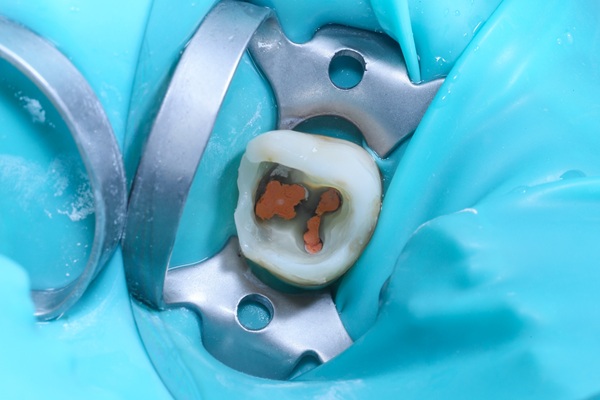Baby Root Canal Fullerton, CA
Baby root canals are common procedures for young children with extensive tooth decay. While it may seem unimportant to treat baby teeth, they build the foundation for strong, healthy permanent teeth. Going without treatment can result in more oral health complications as the child grows. An endodontist only recommends treatment for cases in which a baby root canal will be of benefit to the child.
Baby root canals are available at Saman Malkami DMD in Fullerton and the surrounding area. Our team can help save your child's tooth and eliminate pain and sensitivity associated with their condition. Call us today at (714) 459-8002 to schedule an appointment or learn more about our services.
When a Child Needs a Baby Root Canal
Baby root canals are most often recommended when a tooth has extensive decay or is cracked or broken. According to the American Academy of Pediatric Dentistry, a baby tooth with extensive decay is unlikely to be fixed with a traditional filling. However, it can be completely restored through a root canal treatment and crown, a dental cap that covers the stubbed tooth.
When damage or decay in the tooth is less severe, a pulpotomy may be an option. This procedure removes just the damaged portion of the pulp, or all the pulp in the upper chamber of the tooth, without touching the root canals. The pulp is the interior of the tooth that contains the tooth's blood supply and nerves. The endodontist will remove the damage, stabilize the rest of the healthy pulp, and possibly disinfect and seal the tooth with a crown.
If the pulp tissue is infected through the entire tooth, a pulpectomy, or baby root canal, is necessary. The endodontist will remove all the pulp tissue from the tooth's upper chamber and the roots, disinfect the root canals, and then fill and seal them. A crown will help protect the entire tooth. Both of these procedures are approved for children and use materials designed for a child's health and well-being.
“Baby root canals are most often recommended when a tooth has extensive decay or is cracked or broken.”
Benefits of a Baby Root Canal
Keeping baby teeth healthy until they fall out on their own helps permanent teeth grow into their proper position, helping save on future treatment. The most significant benefit of baby root canals is their ability to save a tooth from extraction. Severely decayed, broken, or cracked teeth that go untreated can result in various oral health complications and often result in extraction, replacement teeth, and damaged surrounding teeth.
Additionally, the enamel of baby teeth is thinner, so decay can spread easily between teeth. Crowns not only save the decayed tooth but help prevent the spread of decay and infection to the rest of the mouth, including the child's permanent teeth. Baby root canals can often prevent early tooth loss in primary teeth, allowing permanent teeth to come in when they are ready. They also provide relief from tooth pain and sensitivity.
“The most significant benefit of baby root canals is their ability to save a tooth from extraction.”
How to Prepare a Child for the Procedure
Prior to initiating any treatment, the patient will come in for an initial consultation. During the appointment, we will go over the child's medical and dental histories and the parent can discuss any concerns or pertinent information regarding the child and their health. The endodontist will take X-rays and determine the cause and severity of the decay before discussing the treatment, sedation options, and follow-up care.
To prepare a child for the procedure, it is important that parents remain calm, confident, and reassuring. We recommend talking to the child prior to their treatment and ensuring them that the procedure will relieve their tooth pain and keep their teeth strong and healthy in the future. We will also talk with the patient about why the procedure is important, what it will do for them, and the ways in which we will keep them comfortable and pain-free during their treatment. There are a few sedation options for children who need extensive work, are anxious, or have special health care needs.
“We recommend talking to the child prior to their treatment and ensuring them that the procedure will relieve their tooth pain and keep their teeth strong and healthy in the future.”
Check out what others are saying about our dental services on Yelp: Baby Root Canal in Fullerton, CA
The Baby Root Canal Procedure
During a baby root canal, the endodontist will first apply an anesthetic to numb the area thoroughly, as discussed in the consultation. The tooth is filed down to allow access to the tooth's pulp and roots. After isolating the tooth, we will then remove any decay and assess the health of the tooth's nerve. If removal of the decay results in exposure of the nerve, or nerve damage, we will remove the infected part of the nerve.
The endodontist will ensure the rest of the nerve is healthy. If it is, we apply medicine to heal the nerve. The tooth will then be covered with a crown. The crown covers the tooth and gives it strength to keep it from fracturing later. It restores the child's tooth to its normal size, shape, and function, matching it to the surrounding teeth. We will curate a temporary crown the day of the procedure until a permanent one is made (roughly two weeks) and will schedule a follow-up for placement of the permanent crown. Children whose permanent teeth are coming in or close to coming in can keep the temporary crown on until the permanent tooth erupts.
“After isolating the tooth, we will then remove any decay and assess the health of the tooth’s nerve.”
Questions Answered on This Page
Q. When is a baby root canal necessary?
Q. What are the benefits of a baby root canal?
Q. How can I prepare my child for a baby root canal?
Q. What happens during a baby root canal procedure?
Q. What does post-procedure care look like?
People Also Ask
Q. What endodontic treatments are available for children?
Q. How is a tooth infection treated?
Q. How does an endodontist treat cracked or broken teeth?
Q. Why is aftercare important following dental trauma?
Follow-Up Care
Following the treatment, the child should be able to resume normal activities right away. Eating should be avoided until the area is no longer numb from the anesthetic to prevent the child from biting the lip or cheek. If the tooth is severely infected, the endodontist may prescribe antibiotics. The area around the tooth will likely be swollen and sensitive for a few days, so an over-the-counter pain reliever designed for children can help relieve discomfort.
The child should continue brushing and flossing twice a day as normal to keep their oral cavity healthy. The patient will need to go over specific care instructions with the dentist before leaving. Although it is rare, it is possible to get an infection after a baby root canal. Parents should call the office if their child experiences increasing pain, new inflammation, or signs of infection around the tooth, increased tooth sensitivity to hot and cold, or an inability to chew on the tooth. These are all signs of a possible infection and should be treated immediately. We will schedule a follow-up visit a week or two after the procedure to ensure the site is healing properly and to place the permanent crown if necessary.
“Eating should be avoided until the area is no longer numb from the anesthetic to prevent the child from biting the lip or cheek.”
Frequently Asked Questions
Q. When is a baby root canal typically recommended?
A. Normal fillings can only be done when a tooth has mild to moderate decay. We typically recommend a baby root canal when a patient has severe decay, their tooth is cracked or broken, or there is a deep infection. The procedure is only done when it will provide more advantages than disadvantages to the child.
Q. Who is qualified to perform a baby root canal?
A. Endodontists are dental specialists who work primarily in treating the pulp, inner tooth, and the structures underneath the teeth. Pediatric endodontists specialize in both endodontic treatments and children, making them the most qualified to perform a baby root canal. General dentists have some knowledge and training in root canals, but they do not typically perform this procedure.
Q. Are baby root canals safe for children?
A. Baby root canals are a common treatment for children. They are safe, effective, and can be completely pain-free. An endodontist will only recommend this treatment if it is necessary or will yield more benefits for the patient.
Q. What will happen if severe decay is left untreated?
A. Going without root canal treatment will result in increased pain and sensitivity that may spread throughout the mouth. This can lead to poor eating and oral hygiene habits as it may become difficult to chew or brush the area. Decay spreads, so going without treatment can affect the surrounding teeth, gums, and underlying bone. Severely decayed or damaged teeth almost always end up requiring an extraction.
Q. What are the advantages of a baby root canal procedure?
A. Baby root canals can help save a severely decayed or damaged tooth and keep the rest of the mouth healthy. It can also prevent problems with speech, eating, and brushing. Lastly, baby root canals provide relief from tooth pain and sensitivity.
Start Feeling Better – Visit Us Today
By visiting us as soon as possible, our team can help get you the professional treatment you need. Instead of waiting around and allowing the symptoms to get worse, we can provide you with treatment options.
Definitions
- Oral cavity
- The entirety of the mouth, including the lips, the lining inside the cheeks and lips, the front two-thirds of the tongue, the upper and lower gums, the floor of the mouth under the tongue, the bony roof of the mouth, and the small area behind the wisdom teeth.
- American Association of Endodontists. Home Page. 2024
- American Board of Pediatric Dentistry. Home Page. 2024
- Cleveland Clinic. Restorative Dentistry. 2024
- Colgate®. Pulpotomy Vs. Pulpectomy: Which Procedure Will Heal Your Tooth? 2024
- Drugs.com. Root Canal in Children. 2024
- Healthline. What you Need to Know About a Pulpectomy. 2024
- New Mouth. Pulpotomy Procedure. 2024
- Parent Circle. Is Root Canal Treatment Necessary For Kids?. 2024
- We accept the following payment methods: American Express, Cash, Check, Discover, MasterCard, and Visa
- We serve patients from the following counties: Orange County
- We serve patients from the following cities: Fullerton, Placentia, Anaheim, Anaheim Hills, Yorba Linda, Buena Park, Brea, Orange, Irvine, Tustin, Newport Beach, West Minister, Garden Grove, Whittier, Fountain Valley, and Long Beach
- CA (License #51168). View License Information and Specifics
- National Provider Identifier Database (1205909132). View NPI Registry Information
- Healthgrades. View Background Information and Reviews
- Norton Safe Web. View Details
- Trend Micro Site Safety Center. View Details
Call Us Today
Baby teeth are important in guiding the proper development of our permanent teeth. Maintaining good oral care and getting any necessary treatments helps build the foundation for healthy growing teeth. Baby root canals can save a child's tooth and relieve pain and sensitivity associated with tooth decay. Call us today at 714-459-8002 to schedule an appointment or learn more about our services.
Helpful Related Links
About our business, license, and website security
Back to top of Baby Root Canal










